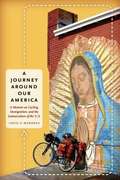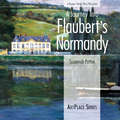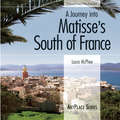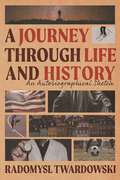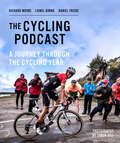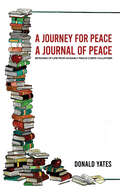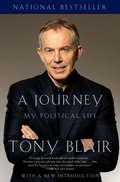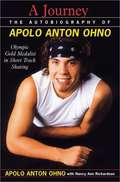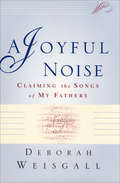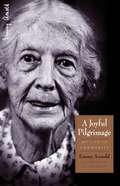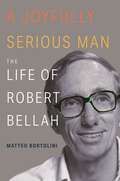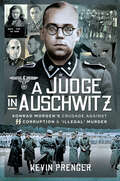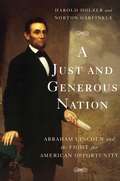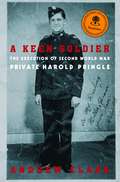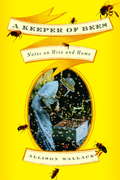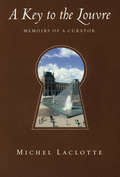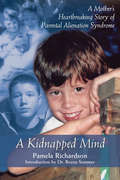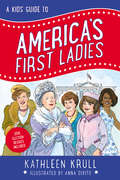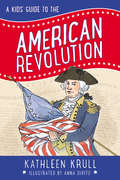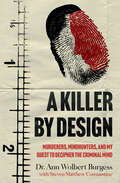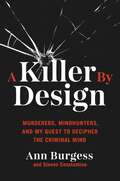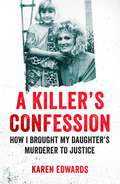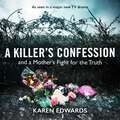- Table View
- List View
A Journey Around Our America: A Memoir on Cycling, Immigration, and the Latinoization of the U.S.
by Louis G. MendozaImmigration and the growing Latino population of the United States have become such contentious issues that it can be hard to have a civil conversation about how Latinoization is changing the face of America. So in the summer of 2007, Louis Mendoza set out to do just that. Starting from Santa Cruz, California, he bicycled 8,500 miles around the entire perimeter of the country, talking to people in large cities and small towns about their experiences either as immigrants or as residents who have welcomed - or not - Latino immigrants into their communities. He presented their enlightening, sometimes surprising, firsthand accounts in Conversations Across Our America: Talking About Immigration and the Latinoization of the United States. Now, in A Journey Around Our America, Mendoza offers his own account of the visceral, emotional, intellectual, and spiritual dimensions of traveling the country in search of a deeper, broader understanding of what it means to be Latino in the United States in the twenty-first century. With a blend of first- and second-person narratives, blog entries, poetry, and excerpts from conversations he had along the way, Mendoza presents his own aspirations for and critique of social relations, political ruminations, personal experiences, and emotional vulnerability alongside the stories of people from all walks of life, including students, activists, manual laborers, and intellectuals. His conversations and his experiences as a Latino on the road reveal the multilayered complexity of Latino life today as no academic study or newspaper report ever could.
A Journey Into Flaubert's Normandy
by Susannah PattonRichly illustrated with maps, historical and contemporary photographs, and period artwork, this guidebook takes tourists and armchair travelers on a stimulating journey through the small towns, rolling hills, and windswept coast of Flaubert's Normandy. The novelist's homes and the locations that are prominently featured in his controversial works are the focus of this pictorial travel guide, and include the ancient town of Rouen, where Flaubert was born in 1821; the resort town of Trouville and its frequently painted beach; Croisset, where Flaubert's riverside house gave him the refuge to write; and the quiet country town of Ry, which claims to be where the real Madame Bovary lived and died.
A Journey Into Matisse's South of France
by Laura McpheeFor more than 50 years the passionate pursuit of color led Henri Matisse to visit some of the most enchanting villages in southern France. Travelers and art lovers will delight in this mix of art, history, biography, and travel guide that covers southern France and explores the teal skies, emerald hills, red soil, and indigo seas beloved by the artist. The journey begins in Paris and then moves to the fashionable port of St. Tropez, the fishing village of Collioure, chic and voluptuous Nice, and the rustic refuge of Vence, and ends in the luxurious resort of Cimiez. The author identifies the villas and studios where Matisse lived and worked in each location and discusses how his art responded to the palette and ambience of each local landscape.
A Journey Through Life and History: An Autobiographical Sketch
by Radomysl Twardowski&“...an evocative autobiographical exploration of personal growth, resilience, and cultural identity…a compelling read for those interested in autobiographical tales that blend historical context with personal reflection.&” – Readers FavoriteRadomysl Twardowski's moving story of growing up in post-war Poland begins with early memories of walks around Krakow with his beloved Grandfather Karol. As it becomes clear to the young Rado that Poland's history is rooted in Christianity, the solemn grandeur and religious atmosphere of places like Wawel Cathedral and other churches begin to have a profound impact on him. He would later be drawn to SSPX and Latin Mass, a subject of debate in the Catholic Church after the Second Vatican Council. After the rise of Solidarity in 1980 and the declaration of martial law in 1981, Rado leaves Poland for the US, where he graduates from medical school and practices cardiology for several years, eventually becoming a proponent for fitness and wellness. Woven throughout this gripping memoir set against the backdrop of dramatic political, religious, and newsworthy developments are the author's stories of hardship and triumph over adversity-from a skiing injury at age twelve that left him with physical limitations to the dissolution of his marriage and a difficult separation from his children. Throughout this memorable journey through history, Twardowski offers us a deeply personal life story of exploration, loss, redemption, and survival.
A Journey Through the Cycling Year
by The Cycling PodcastReaders as well as listeners can now embark on a journey through the cycling year with The Cycling Podcast, which has been entertaining and informing fans since 2013. Richard Moore, Lionel Birnie and Daniel Friebe share their diaries from three incident-filled Grand Tours, the Giro d’Italia, Tour de France and Vuelta a España. These take readers behind the scenes and explore the culture and landscape as well as the racing, while the ‘Lionel of Flanders’, complete with beer recommendations, does the same for the Classics in Belgium.There are appearances, too, by leading journalists and podcast favourites François Thomazeau, who takes responsiblity for the French Tour de France jinx, Ciro Scognamiglio, with a heartfelt love letter to cult favourite Filippo Pozzato, Fran Reyes, who pens a farewell to El Pistolero, Alberto Contador, and Orla Chennaoui, who hits the road to cover La Course in a one-woman karaoke-booth-on-wheels.Further contributions from professional riders Ashleigh Moolman Pasio and Joe Dombrowski and the voice of the Tour de France, Sebastien Piquet, as well as stunning galleries from the podcast world’s first and only dedicated photographer, Simon Gill, make this the perfect celebration of a year in cycling.
A Journey for Peace: Episodes of Life from an Early Peace Corps Volunteer
by Donald YatesDon Yates enrolled as a Peace Corps Volunteer after responding to the challenge then-President John F. Kennedy issued to young Americans to &‘ask not what your country can do for you; ask what you can do for your country.&’ From compiling over 500 pages of a diary kept while he worked as an educator and community developer in the Philippine Islands on the southern island of Jolo in the Sulu Archipelago, he gleaned over 25 stories, or episodes, depicting highlights of his life there along with reflections of local culture. Many episodes, such as the prologue entitled Culture Shock, depict a young man&’s orientation and involvement in a way of life very different from his upbringing as an American. Complete with photographs from his two-year tour of duty, Don has captured the essence of an area of the world rarely seen or visited by outsiders while sharing how he grew as a young man in a foreign land.
A Journey: My Political Life
by Tony BlairTony Blair is a politician who defines our times. His emergence as Labour Party leader in 1994 marked a seismic shift in British politics. Within a few short years, he had transformed his party and rallied the country behind him, becoming prime minister in 1997 with the biggest victory in Labour's history, and bringing to an end eighteen years of Conservative government. He took Labour to a historic three terms in office as Britain's dominant political figure of the last two decades.A Journey is Tony Blair's firsthand account of his years in office and beyond. Here he describes for the first time his role in shaping our recent history, from the aftermath of Princess Diana's death to the war on terror. He reveals the leadership decisions that were necessary to reinvent his party, the relationships with colleagues including Gordon Brown, the grueling negotiations for peace in Northern Ireland, the implementation of the biggest reforms to public services in Britain since 1945, and his relationships with leaders on the world stage--Nelson Mandela, Bill Clinton, Vladimir Putin, George W. Bush. He analyzes the belief in ethical intervention that led to his decisions to go to war in Kosovo, Sierra Leone, Afghanistan, and, most controversially of all, in Iraq. A Journey is a book about the nature and uses of political power. In frank, unflinching, often wry detail, Tony Blair charts the ups and downs of his career to provide insight into the man as well as the politician and statesman. He explores the challenges of leadership, and the ramifications of standing up, clearly and forcefully, for what one believes in. He also looks ahead, to emerging power relationships and economies, addressing the vital issues and complexities of our global world.Few British prime ministers have shaped the nation's course as profoundly as Tony Blair, and his achievements and his legacy will be debated for years to come. Here, uniquely, we have his own journey, in his own words.From the Hardcover edition.
A Journey: The Autobiography of Apolo Anton Ohno
by Nancy Ann Richardson Apolo Anton OhnoI honestly don't know what battles I'm going to face next, only that I have the spirit and the will to face anything and fight for my sport and for what I believe is right. I'll give 110 percent and still dig down deeper for more. Apolo Anton Ohno won both a gold and a silver medal at the 2002 Olympic Games and became an instant hero. But his Olympic victory represents just one moment of his incredible, and continuing journey.From an early age, his father, Yuki, recognized Apolo's natural abilities and made it his mission to help his son live up to his potential. But getting Apolo to follow through on his opportunities wasn't always easy. Like many kids, Apolo struggled to balance his energetic and fiercely competitive nature with his desire for independence and freedom. And even as he succeeded on the ice, he felt the loneliness that comes with being at the top. Amid the pain, the fear, the uncertainty, Apolo asked himself again and again, Why am I doing this? And the answer came to him: He truly loved to skate. So with laser-sharp focus he pursued his number-one goal: to become a great athlete.From his personal struggles to his unwavering commitment and ambition, Apolo Anton Ohno is a true example of courage. He has battled his personal demons, toppled physical barriers, and clawed his way to the top -- but even now he does not rest. Always, he looks within himself to hear his strongest critic, to face his fiercest competitor. And always, he continues to strive to be the best -- not just for his team, not just for his country -- but also for himself. And that is what makes Apolo Anton Ohno a true champion. This is his story.
A Joyful Noise: Claiming the Songs of My Fathers
by Deborah WeisgallIn A Joyful Noise, Deborah Weisgall tells a moving story of her turbulent coming-of-age in the shadow of two remarkable men who lived life as if they were characters in an opera. The daughter of a mercurial composer and the granddaughter of a legendary cantor, Deborah as a child longed to be entrusted with their precious music and carry it on herself. But it was impossible; she was a girl. A Joyful Noise recounts Deborah's search for a place within the family tradition and, finally, her triumphant discovery of a way to make the men who would exclude her — who were also the men she loved — listen to her voice. A Joyful Noise is a tender, heartbreaking, beautifully written chronicle of the power of memory, the survival of faith, and the pursuit of a grand musical heritage. "A superbly written chronicle encompassing the grand themes of the power of memory and the survival of faith." — The Jewish Transcript; "Weisgall has written a valuable book." — The New York Times Book Review; "This is a lovely memoir of life in the acutely functional family of a fine and learned composer. Deborah Weisgall writes of a milieu of discourse immersed in and emerging from music, and in which love and knowledge are not at odds. . . . A Joyful Noise is that of her own particular music of remembering." — John Hollander; "An absorbing memoir, with music in the background and foreground." — New York Jewish Week.
A Joyful Pilgrimage: My Life in Community
by Emmy ArnoldBack Cover: "In the tumultuous aftermath of the First World War, thousands of young Germans defied the social mores of their parents--and the constricting influence of the established churches--in search of freedom, social equality, nature, and community. Hiking clubs were formed and work camps organized, and hundreds of rural folk schools and communes sprang up across the country. In the 1930s, Nazism swallowed this so-called Youth Movement virtually whole. A Joyful Pilgrimage is the engaging story of a remnant that survived: the Bruderhof, a 75-year-old community that began when the author and her husband, a well-known writer and lecturer, abandoned their affluent Berlin suburb to start a new life and "venture of faith." At first glance a memoir, A Joyful Pilgrimage is a radical call to faith and commitment against great odds. It is also a remarkable testimony to the leading of the Spirit, which, as Emmy Arnold writes, can hold together those who believe in the 'daily miracle' of community 'through thick and thin.'" [It is a] "moving story... and an amazing continuation of the Book of Acts."
A Joyfully Serious Man: The Life of Robert Bellah
by Matteo BortoliniThe brilliant but turbulent life of a public intellectual who transformed the social sciencesRobert Bellah (1927–2013) was one of the most influential social scientists of the twentieth century. Trained as a sociologist, he crossed disciplinary boundaries in pursuit of a greater comprehension of religion as both a cultural phenomenon and a way to fathom the depths of the human condition. A Joyfully Serious Man is the definitive biography of this towering figure in modern intellectual life, and a revelatory portrait of a man who led an adventurous yet turbulent life.Drawing on Bellah's personal papers as well as in-depth interviews with those who knew him, Matteo Bortolini tells the story of an extraordinary scholarly career and an eventful and tempestuous life. He describes Bellah's exile from the United States during the hysteria of the McCarthy years, his crushing personal tragedies, and his experiments with sexuality. Bellah understood religion as a mysterious human institution that brings together the scattered pieces of individual and collective experiences. Bortolini shows how Bellah championed intellectual openness and innovation through his relentless opposition to any notion of secularization as a decline of religion and his ideas about the enduring tensions between individualism and community in American society.Based on nearly two decades of research, A Joyfully Serious Man is a revelatory chronicle of a leading public intellectual who was both a transformative thinker and a restless, passionate seeker.
A Judge in Auschwitz: Konrad Morgen's Crusade Against SS Corruption & 'Illegal' Murder
by Kevin PrengerIn autumn 1943, SS judge Konrad Morgen visited Auschwitz concentration camp to investigate an intercepted parcel containing gold sent from the camp. While there Morgen found the SS camp guards engaged in widespread theft and corruption. Worse, Morgen also discovered that inmates were being killed without authority from the SS leadership. While millions of Jews were being exterminated under the Final Solution programme , Konrad Morgen set about gathering evidence of these ‘illegal murders’. Morgen also visited other camps such as Buchenwald where he had the notorious camp commandant Karl Koch and Ilse, his sadistic spouse, arrested and charged. Found guilty by an SS court, Koch was sentenced to death. Remarkably, the apparently fearless SS judge also tried to prosecute other Nazi criminals including Waffen-SS commanders Oskar Dirlewanger and Hermann Fegelein and Auschwitz Commandant Rudolf Höss. He even claimed to have tried to indict Adolf Eichmann, who was responsible for organising the mass deportation of the Jews to the extermination camps. This intriguing work reveals how the lines between justice and injustice became blurred in the Third Reich. As well as describing the actions of this often contradictory character the author questions Morgen’s motives.
A Just and Generous Nation: Abraham Lincoln and the Fight for American Opportunity
by Harold Holzer Norton GarfinkleIn A Just and Generous Nation, the eminent historian Harold Holzer and the noted economist Norton Garfinkle present a groundbreaking new account of the beliefs that inspired our sixteenth president to go to war when the Southern states seceded from the Union. Rather than a commitment to eradicating slavery or a defense of the Union, they argue, Lincoln’s guiding principle was the defense of equal economic opportunity. Lincoln firmly believed that the government’s primary role was to ensure that all Americans had the opportunity to better their station in life. As president, he worked tirelessly to enshrine this ideal within the federal government. He funded railroads and canals, supported education, and, most importantly, issued the Emancipation Proclamation, which opened the door for former slaves to join white Americans in striving for self-improvement. In our own age of unprecedented inequality, A Just and Generous Nation reestablishes Lincoln’s legacy as the protector not just of personal freedom but of the American dream itself.
A Keen Soldier: The Execution of Second World War Private Harold Pringle
by Andrew ClarkWhen award-winning journalist Andrew Clark found the file on Harold Joseph Pringle, he uncovered a Canadian tragedy that had lain buried for fifty years. This extraordinary story of the last soldier to be executed by the Canadian military -- likely wrongfully -- gives life to the forgotten casualties of war and brings their honour home at last. Harold Pringle was underage when the Second World War broke out, eager to leave quiet Flinton, Ontario, to serve by his father’s side. But few who volunteered to fight “the good fight” realized what horror lay ahead; soon Pringle found himself in Italy, fighting on the bloody “Hitler Line,” where two-thirds of his company were killed. Shell-shocked, he embarked on a tragic, final course that culminated in a suspect murder conviction. His appeal was reviewed by the highest levels of government, right up to prime minister King. But Private Pringle was put to death -- the only soldier the Canadians executed in the whole of the Second World War. His own countrymen carried out the orders, forbidden to go home before completing this last grotesque assignment, even though the war had ended. The Pringle file was closed and stayed that way for fifty years -- until Andrew Clark uncovered it and began a two-year investigation on Pringle’s life in the army. A Keen Soldieris a true-life military detective story that shows another side of what many consider our proudest military campaign. Andrew Clark examines the fallout of a crisis that disfigured our national conscience and continues to raise questions about the ethics of war. And he does so with eloquence and a deep compassion, not only for his subject but for all wartime soldiers -- even the men who executed Pringle and the officer who gave the order to fire. From the Hardcover edition.
A Keeper of Bees: Notes on Hive and Home
by Allison WallaceI was hooked. Call it adrenaline surge, call it honeybee venom in my veins-whatever the explanation, henceforth I would need these funky little critters in my life. Givers of sweet, thick honey, bringers forth of the fruits from trees and bushes and who knew what else, they also gave more food for thought than a body could know what to do with. -fromA Keeper of Bees Allison Wallace's devotion to honeybees and their amazing, intensely lived lives started years ago, when she was living in a cabin in the North Carolina woods. Ever since then, wherever she has called home, Wallace has kept company with bees. Now she gives us the honeybee in all its glory, dancing "the great, never fully knowable ecological dance," striving like other creatures and plants to be all it can be in its short life. With a philosopher's perception and a scientist's knowledge, Wallace interweaves the facts of honeybee biology with reflections on desire, intimacy, work, evolution, memory, and home. She shares the thrill of intimately observing thousands of busy bees cozily ensconced in their brilliantly designed, perfectly weatherproofed hive. She muses on the female workers' unceasing activity, and on the male drones' idleness as each awaits his acrobatic midair mating with the queen, followed by his instant death. She marvels at the cosseted queen, upon whom the future of the hive depends. From the Hardcover edition.
A Key to the Louvre: Memoirs of a Curator
by Mark Polizzotti Michel LaclotteAn art world insider provides a witty and penetrating account of fifty years at the center of international culture.<P><P>Art historian, curator, and museum director Michel Laclotte has been at the forefront of French cultural life over the past half century. This informal autobiography sheds light on his brilliant career with warmth and directness. Highlights include twenty years as chief curator of painting and sculpture at the Musée du Louvre, heading the team that created the Musée dOrsay, and taking the reins of the Louvre to lead the effort that culminated in the museums transformation into the "Grand Louvre," one of the worlds preeminent cultural attractions.Raising the curtain on fifty years of Western art scholarship, intrigue, and achievement, Laclotte introduces an extraordinary cast of characters who set Frances cultural direction in the postwar period from Charles de Gaulle and André Malraux in the 1950s to François Mitterand in the 1980s and 1990s. His story overlaps with virtually every major scholarly figure in French art history of the last half-century, as well as Laclottes mentors and colleagues throughout and beyond Europe, from Roberto Longhi and Anthony Blunt to Sir John Pope-Hennessy and Millard Meiss. An incomparable testament to a period of seismic change in the museum world, this volume will be essential reading for art world afficianados and all students of art and modern culture.
A Kidnapped Mind: A Mother's Heartbreaking Memoir of Parental Alienation
by Pamela RichardsonHow do we begin to describe our love for our children? Pamela Richardson shows us with her passionate memoir of life with and without her estranged son, Dash. From age five Dash suffered Parental Alienation Syndrome at the hands of his father. Indoctrinated to believe his mother had abandoned him, after years of monitored phone calls and impeded access eight-year-old Dash decided he didn’t want to be "forced" to visit her at all; later he told her he would never see her again if she took the case to court. But he didn’t count on his indefatigable mother’s fierce love. For eight more years Pamela battled Dash’s father, the legal system, their psychologist, the school system, and Dash himself to try and protect her son - first from his father, then from himself. A Kidnapped Mind is a heartrending and mesmerizing story of a Canadian mother’s exile from and reunion with her child, through grief and beyond, to peace.
A Kids' Guide to America's First Ladies (Kids' Guide to American History #1)
by Kathleen Krull Anna DivitoChildren’s Book Guild Nonfiction Award-winner Kathleen Krull is an expert at bringing history to life in her engaging titles and series, including Women Who Broke the Rules, Lives of . . . , Giants of Science, and A Kid’s Guide to America’s Bill of Rights. This time, she introduces readers to the women of the White House in A Kid’s Guide to America’s First Ladies! The book includes a section introducing kids to Melania Trump.Find out what our country’s First Ladies thought, did, and advocated for as they moved into the White House.Why did the Patriots love Martha Washington?What causes did Eleanor Roosevelt support and lead?What did Jacqueline Kennedy do to establish her legacy long after she left the White House?How did Hillary Clinton turn her role as First Lady into a political career of her own?Packed with anecdotes and sidebars, a timeline of the advancement of women’s rights, and humorous illustrations and portraits, Kathleen Krull’s introduction to the First Ladies of the United States brings vividly to life the women to hold the role as they paved the way for American women in times of change.
A Kids' Guide to the American Revolution (Kids' Guide to American History #2)
by Kathleen Krull Anna DiVitoPacked with anecdotes, sidebars, quotes, and illustrations, A Kids' Guide to the American Revolution brings vividly to life the birth of our nation.Introduce young readers to the stakes, challenges, setbacks, and victories involved in the single most important event in our nation’s history, the American Revolution, with this approachable book from Kathleen Krull, a Children’s Book Guild Nonfiction Award winner.Find out what events led our young nation to go to war with Great Britain and how the Declaration of Independence, the document that continues to shape our civil rights, came to be.• Why did the colonists want independence from Great Britain?• What brought on the Boston Tea Party?• How did the Declaration of Independence initially impact women and slaves?• What did Benjamin Franklin do to convince the French to join the revolution? • How was George Washington chosen to lead the new young country?• What elements of the Declaration of Independence continue to be debated today?Kathleen Krull is an expert at bringing history to life in her engaging titles and series, including Women Who Broke the Rules, Lives of . . . , Giants of Science, and her other books in A Kids’ Guide series, A Kids' Guide to America’s Bill of Rights and A Kids’ Guide to America’s First Ladies.
A Killer By Design: Murderers, Mindhunters, and My Quest to Decipher the Criminal Mind
by Ann Wolbert Burgess Steven Matthew Constantine'I think you have something here' I said, 'This could lead to a whole new way of understanding criminal behaviour. As far as I know no one's ever tried to figure out why serial killers kill. The implications are profound.' Haunting, heartfelt, and deeply human, Dr Ann Burgess's remarkable memoir combines a riveting personal narrative of fearless feminism and ambition, bone-chilling encounters with real-life monsters, and a revealing portrait of the ever-evolving US criminal justice system. A Killer By Design will inspire, terrify, and enlighten you in equal measure.It forces us to confront the age-old question 'What drives someone to kill, and how can we stop them?' 'Of all the colleagues I've worked with, Ann is one of the sharpest – and one of the toughest ... She taught us how to harness the chaos of serial killers' minds and helped us decipher the undecipherable. I'd recommend that everyone read A Killer By Design; not only is it a great page-turner, but it's about time Ann's story was heard' - JOHN E. DOUGLAS, former FBI criminal profiler and bestselling author of Mindhunter.
A Killer by Design: Murderers, Mindhunters, and My Quest to Decipher the Criminal Mind
by Ann Wolbert Burgess**A "BEST BOOK OF THE MONTH" PICK FOR AMAZON (DECEMBER 2021)****ONE OF AMAZON'S "BEST TRUE CRIME" BOOKS**A vivid behind-the-scenes look into the creation of the FBI's Behavioral Science Unit and the evolution of criminal profiling, written by the pioneering forensic nurse who transformed the way the FBI studies, profiles, and catches serial killers. Lurking beneath the progressive activism and sex positivity in the 1970-80s, a dark undercurrent of violence rippled across the American landscape. With reported cases of sexual assault and homicide on the rise, the FBI created a specialized team—the &“Mindhunters&” better known as the Behavioral Science Unit—to track down the country's most dangerous criminals. And yet narrowing down a seemingly infinite list of potential suspects seemed daunting at best and impossible at worst—until Dr. Ann Wolbert Burgess stepped on the scene.In A Killer By Design, Burgess reveals how her pioneering research on sexual assault and trauma caught the attention of the FBI, and steered her right into the middle of a chilling serial murder investigation in Nebraska. Over the course of the next two decades, she helped the budding unit identify, interview, and track down dozens of notoriously violent offenders, including Ed Kemper ("The Co-Ed Killer"), Dennis Rader ("("BTK"), Henry Wallace ("The Taco Bell Strangler"), Jon Barry Simonis ("The Ski-Mask Rapist"), and many others. As one of the first women trailblazers within the FBI&’s hallowed halls, Burgess knew many were expecting her to crack under pressure and recoil in horror—but she was determined to protect future victims at any cost. This book pulls us directly into the investigations as she experienced them, interweaving never-before-seen interview transcripts and crime scene drawings alongside her own vivid recollections to provide unprecedented insight into the minds of deranged criminals and the victims they left behind. Along the way, Burgess also paints a revealing portrait of a formidable institution on the brink of a seismic scientific and cultural reckoning—and the men forced to reconsider everything they thought they knew about crime.Haunting, heartfelt, and deeply human, A Killer By Design forces us to confront the age-old question that has long plagued our criminal justice system: &“What drives someone to kill, and how can we stop them?&”
A Killer's Confession: And a Mother's Fight for the Truth
by Karen EdwardsA mother's story behind one of the most dramatic true crime cases in recent history. 'I have lived every parent's worst nightmare. On what would have been my daughter's 29th birthday, Detective Superintendent Stephen Fulcher knocked on the door and told me my beautiful Becky was dead. Found buried in a shallow grave in a remote field, Becky had been brutally murdered.'When Becky Godden-Edwards was killed, her mother Karen awoke to a world where the truth was never guaranteed; where taxi driver Christopher Halliwell got away with murder and the police officer who found her daughter was punished instead. This is Karen's story. Despite unimaginable tragedy, her love for her daughter has been unbreakable: from her despair through Becky's troubled teenage years, to the agonising eight years when Becky was missing, and then the dramatic story of how a killer's confession led to a terrible discovery. The one constant has been Karen's determination to fight for Becky, tirelessly campaigning for the truth about what happened to be heard and for Halliwell to face the consequences of his evil actions. *The murders of Becky Godden-Edwards and Sian O'Callaghan will soon be the focus of major new ITV series A Confession starring Martin Freeman as Stephen Fulcher and Imelda Staunton as Karen Edwards*
A Killer's Confession: How I Brought My Daughter's Murderer to Justice
by Karen EdwardsA mother's story behind one of the most dramatic true crime cases in recent history. 'I have lived every parent's worst nightmare. On what would have been my daughter's 29th birthday, Detective Superintendent Stephen Fulcher knocked on the door and told me my beautiful Becky was dead. Found buried in a shallow grave in a remote field, Becky had been brutally murdered.'When Becky Godden-Edwards was killed, her mother Karen awoke to a world where the truth was never guaranteed; where taxi driver Christopher Halliwell got away with murder and the police officer who found her daughter was punished instead. This is Karen's story. Despite unimaginable tragedy, her love for her daughter has been unbreakable: from her despair through Becky's troubled teenage years, to the agonising eight years when Becky was missing, and then the dramatic story of how a killer's confession led to a terrible discovery. The one constant has been Karen's determination to fight for Becky, tirelessly campaigning for the truth about what happened to be heard and for Halliwell to face the consequences of his evil actions. *The murders of Becky Godden-Edwards and Sian O'Callaghan will soon be the focus of major new ITV series A Confession starring Martin Freeman as Stephen Fulcher and Imelda Staunton as Karen Edwards*(P)2019 Headline Publishing Group Ltd
A Killer's Confession: How I Brought My Daughter's Murderer to Justice
by Karen EdwardsA mother's fight to bring her daughter's killer, Christopher Halliwell, to justice'I have lived every parent's worst nightmare. On what would have been my daughter's 29th birthday, Detective Superintendent Stephen Fulcher knocked on the door and told me my beautiful Becky was dead. Found buried in a shallow grave in a remote field, Becky had been brutally murdered.'When Becky Godden-Edwards was killed, her mother Karen awoke to a world where the truth was never guaranteed; where taxi driver Christopher Halliwell got away with murder and the police officer who found her daughter was punished instead. This is Karen's story. Despite unimaginable tragedy, her love for her daughter has been unbreakable: from her despair through Becky's troubled teenage years, to the agonising eight years when Becky was missing, and then the dramatic story of how a killer's confession led to a terrible discovery. The one constant has been Karen's determination to fight for Becky, tirelessly campaigning for the truth about what happened to be heard and for Halliwell to face the consequences of his evil actions. *The murders of Becky Godden-Edwards and Sian O'Callaghan will soon be the focus of major new ITV series A Confession starring Martin Freeman as Stephen Fulcher and Imelda Staunton as Karen Edwards*
A Killer's Confession: How I Brought My Daughter's Murderer to Justice
by Karen EdwardsA mother's fight to bring her daughter's killer, Christopher Halliwell, to justice'I have lived every parent's worst nightmare. On what would have been my daughter's 29th birthday, Detective Superintendent Stephen Fulcher knocked on the door and told me my beautiful Becky was dead. Found buried in a shallow grave in a remote field, Becky had been brutally murdered.'When Becky Godden-Edwards was killed, her mother Karen awoke to a world where the truth was never guaranteed; where taxi driver Christopher Halliwell got away with murder and the police officer who found her daughter was punished instead. This is Karen's story. Despite unimaginable tragedy, her love for her daughter has been unbreakable: from her despair through Becky's troubled teenage years, to the agonising eight years when Becky was missing, and then the dramatic story of how a killer's confession led to a terrible discovery. The one constant has been Karen's determination to fight for Becky, tirelessly campaigning for the truth about what happened to be heard and for Halliwell to face the consequences of his evil actions. *The murders of Becky Godden-Edwards and Sian O'Callaghan will soon be the focus of major new ITV series A Confession starring Martin Freeman as Stephen Fulcher and Imelda Staunton as Karen Edwards*
